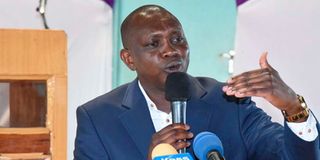MPs should stop forging degree certificates

Kapseret MP Oscar Sudi during a past church function in Kipkaren estate, Eldoret town of Uasin Gishu County on August 22, 2021.
What you need to know:
- As of now, the law requires only the President, the Deputy President and governors and their deputies to be degree holders.
- Instead of cutting corners in unethical ways, the affected MPs can simply lobby to have the proposed law overturned.
Lately, we have been hearing funny stories of the lengths to which some MPs go to acquire degree certificates. The esteemed gentlemen cannot be bothered to sit down and study through the set semesters. Using shortcuts and cutting corners has become the norm.
Personally, I don’t prefer judging leaders by the certificates they have. You can be of modest education but as long as you have the necessary wisdom, and have the good sense to seek and apply expert advice where it is called for, you're okay with me. Being able to read and write should be the basic minimum.
High academic qualifications, though desirable, should not be mandatory. However, once Parliament amended the Elections Act such that in future candidates seeking to become MPs must hold degrees, that requirement will have to be respected. Not circumvented in unorthodox ways. I may have a problem with that intended law. But rules are rules. MPs have no choice but follow them. They imposed them anyway.
Actually, the degree rule is not yet a binding legal requirement. The Bill was passed in 2011 and was supposed to be implemented in 2013. But since so many MPs did not have the required papers, it was pushed to 2017 for implementation. It stalled again. Chances are it could be implemented in time for the next election, if at all.
As of now, the law requires only the President, the Deputy President and governors and their deputies to be degree holders.
It is unsettling to see, in anticipation of the implementation of the law, the shameless spree many MPs have embarked on to acquire degrees illegally. Some opt to buy their degrees outright. After registering with a university, they are never seen there again. Yet come graduation day, they arrive in splendid gowns brandishing certificates.
Others allegedly use outright criminal methods. They forge those certificates.
An alarming number of universities are reportedly guilty of condoning these shortcuts. However, the malpratices are said to be most rampant in the lower-end institutions. It tells you the rot we have allowed to creep everywhere in this country.
Unethical ways
Buying certificates when you don't qualify is corruption, pure and simple. Worse, it diminishes the standing of our academic institutions and makes it that much harder for local certificates to be accepted without extra scrutiny by reputable overseas universities.
The Independent Electoral and Boundaries Commission (IEBC) should act vigilantly when clearing parliamentary candidates next year to weed out the rogues. It should not be too difficult to identify the individuals who have dodgy academic documents.
The government should also act to sanction colleges that issue the unworthy certificates knowingly.
I understand there is a large number of sitting MPs who may not qualify for re-election because of the degree rule.
Instead of cutting corners in unethical ways, the affected MPs can simply lobby to have the proposed law overturned. That is what the MCAs did when confronted with the same degree requirement. They took their case to court and won an exemption.
Otherwise the situation is only giving currency to the mischief of the likes of Embakasi East MP Babu Owino who, not too long ago, and with tongue in cheek, offered to sell his extra degree and diploma certificates to his colleagues who did not have them.
Babu, who spent an inordinate time in university as a student leader, claims to have four degrees and six diplomas.
It is quite possible the law could be amended, or its implementation delayed yet again. MPs cite the Covid-19 rampage last year, which interrupted degree programmes in many universities.
***
The situation is very fluid in Ethiopia, Kenya's northern neighbour and Africa's second most populous country. Tigrayan forces have now taken the offensive in a war that started last year when Ethiopian federal troops invaded the Tigray region. They have captured several towns in the Amhara and Afar regions, and are threatening to move south and take Addis Ababa.
The government of Prime Minister Abiy Ahmed has declared a state of emergency and called up retired soldiers and ethnic militias to defend their neighbourhoods.
Clearly, things are tight for the federal government. The Oromo Liberation Army, which claims to represent the largest ethnic group, has formally announced it is joining the Tigray offensive against Abiy's government.
Abiy is Oromo, but in his case blood is not thicker than water. Oromo militants oppose him for refusing to support their ethnic agenda, including the creation of an independent state of Oromia.
The UN Security Council has issued a call for an urgent ceasefire, but has been ignored.
Ethiopia conflict
The African Union is handicapped. With its headquarters in Addis Ababa, it finds it difficult to be even-handed in mediating between its host the federal government and the Tigray rebels.
Kenya should be wary. If the fighting extends to the south, there's the likelihood of a huge spillover of refugees from the regions occupied by the Oromos and others into Kenya, where they have ethnic relatives.
Ethiopia is a difficult country to govern. It has many populous nationalities which would wish to be independent.
In theory, the country's constitution allows for any region to secede.
For now, the country is held together by allowing a large measure of autonomy to the key regions.





